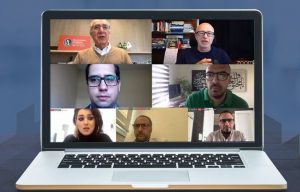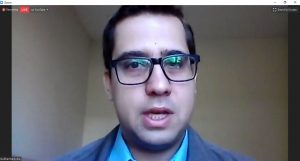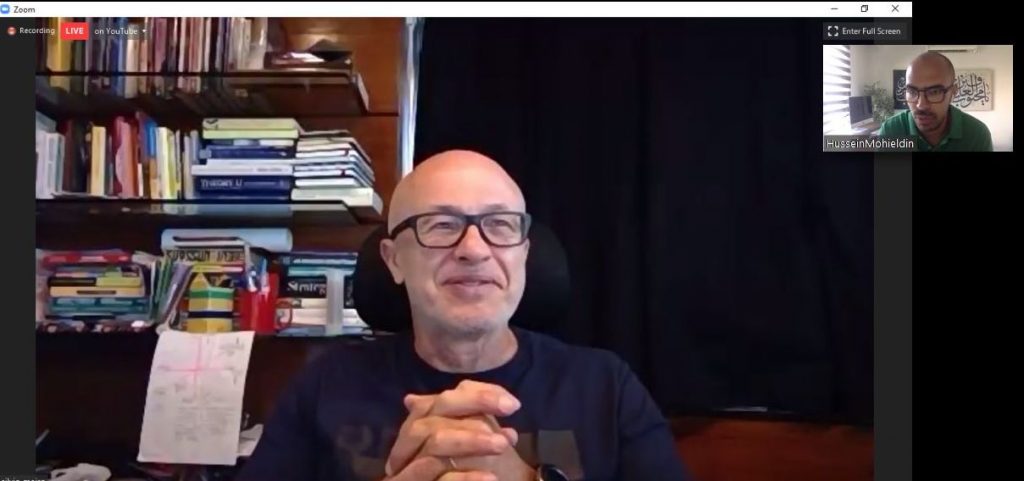São Paulo – The Covid-19 pandemic is forcing companies to race towards digital business. But simply putting out a technological product or using an online sales tool isn’t enough to become part of this novel universe. One of Brazil’s foremost specialists in innovation, Silvio Meira, discussed what it means to be a digitally transformed business, during a webinar hosted this Wednesday (27) by the Arab Brazilian Chamber of Commerce. The webinar got 640 viewers in Brazil and other countries.
A software engineer by trade, Meira is the chief scientist with The Digital Strategy Company and an emeritus professor at the innovation-centric Cesar School. According to him, Covid-19 triggered a digital apocalypse, condensing entire decades into a few weeks. “The thing is all of these futures began to happen for everyone at the same time, and for businesses, obviously, whether they like it or not,” he said.

He said e-commerce orders in Brazil soared 98% year-on-year in April, with online sales climbing as much as 300% in industries such as food and beverages. E-commerce was expected to be up 15% at most in 2020 in Brazil. “This is testimony to this apocalypse, of this download of 25 years’ worth of digital into a handful of weeks,” said Silvio Meira.
The engineer traced back the history of technology, from the exchange of electronic documents from the 1970s to the 1990s to the early online businesses of the 1990 and 2000, and the advent of the commercial internet in 1995. According to him, from the mid-2020s onward the world will witness a universe of digital ecosystems organized and enabled by digital business platforms.
“With what’s going on, companies have two basic alternatives: the first one is to radically and urgently redesign, into digital mode, their operating systems, the mechanisms, the foundations that enable their performance and business models. The other one is to continue to lobby for a reopening of the economy in analog mode, and to keep working in analog mode,” said Meira.
He believes the transition to digital should take into consideration each company’s business model, and that there’s no turning back now. According to Meira, digital innovation must factor in market, supplier and shopper behavior, and it must involve the implementation of digital platforms and strategic transformation. “A shift in form and structure, in the syntax, the semantics of businesses,” he said.

According to the engineer, this transformation implies greater speed, doing more with less, boosting efficiency, improving shopper experience, and other operational aspects. “We must innovate in order to transform our business model into digital mode, and we must do that in the middle of the windstorm that’s happening right now,” he said.
Meira said that going from analog to digital means going from rigid to collaborative. “Businesses are usually structured out not to collaborate. They are meant to be pyramids or silos, and within this big silo that is a business, there are more silos which don’t have many interfaces. That is the antithesis of a network-based process, where you collaborate to attain goals and targets that you share with the ecosystem,” he explained.
Businesses embracing this new model are featuring more and more efficient, capable staff that are less dependent, at times with no middle management, according to Meira. “The professional of the future is the genspecialist, who knows almost everything about almost nothing, and yet they have the eyes and ears to get across to other specialists who also know almost everything about almost nothing, so they’re able to understand one another and make concerted efforts to do distributed, decentralized work,” says the professor.
Arab Chamber president Rubens Hannun said that with an optimistic outlook, this new digital world is fascinating. “How many challenges we have ahead of us! They playing field is really level, and going forward all that’s left is to build,” he said. Hannun said the topic for the webinar was picked because it impacts the entire global community. “Some were already in the process, others are getting started, and I see some that need to start,” he said.

Solinftec CEO Rodrigo Iafelice dos Santos, who joined the webinar, asked Meira whether it is feasible to fast-track digital transformation in the countryside, since the internet isn’t even available in many places. Solinftec provides agribusiness tech solutions around the world. “We are looking at this as a time to overcome challenges,” said Santos. According to Meira, countryside depends on public policies for an infrastructure that enables digital access. The lack thereof leaves room available for small-scale tech entrepreneurs, or small local providers.
The webinar also featured Arab Chamber secretary-general Tamer Mansour, Adélia Mendonça Cosmetics CEO Jacqueline Mendonça, Egyptian startup company Robusta CEO Hussein Mohieldin, and Metro Brazil CEO Alaa Kara Ali.
Click on the links for more on the webinar and for the full webinar on YouTube.
Digital transformation drives change in consumption
Influencers, chatbots are allies in sales to Arab countries
Translated by Gabriel Pomerancblum




